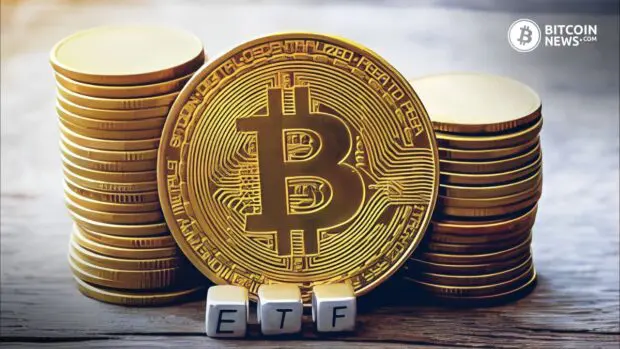As with most things in digital assets, there was absolute chaos surrounding the announcement. The Securities and Exchange Commission was left red-faced after a social media post was released prematurely — prompting dramatic swings in BTC markets.
But what are spot Bitcoin ETFs, and why is their debut on the stock market so significant for Bitcoin? Here, we’ll tell you everything you need to know.
What is a Spot Bitcoin ETF?
Exchange-traded funds are already pretty common — they trade on stock exchanges and issue shares. Generally speaking, ETFs allow investors to gain exposure to assets without requiring to own them directly.
For example, someone interested in tracking the S&P 500 may not have the time and inclination to buy all 500 stocks, and ensure they’re weighted correctly. An ETF does that for them. Others focus on specific sectors such as healthcare, defense, AI, or consumer stocks.
Until now, an ETF tracking Bitcoin’s spot price has not existed. Instead, funds have only been able to track the futures market, which isn’t as reliable an indicator of BTC’s value.
Following the SEC’s decision, a grand total of 11 Bitcoin ETFs have been given the green light. BlackRock, one of the world’s largest asset managers, is among the issuers — along with Fidelity, Grayscale, Ark Invest and Bitwise.
What is the Difference Between Owning Bitcoin and Owning an ETF?
When you own Bitcoin, it’s your job to keep it secure — whether this is by storing it on a hardware wallet or entrusting a custodian to do so on your behalf.
Owning Bitcoin can be somewhat of a hassle for new joiners as it can be hard to find a use case other than store of value. This is why many individuals and businesses prefer owning BTC-pegged tokens such as Rootstock’s smart Bitcoin (RBTC) which can be used both as a store of value, like Bitcoin, as well as to settle transactions on the Rootstock chain.
However, investing in a Bitcoin ETF means that you don’t have direct ownership of any digital asset. This can be especially appealing for certain market participants. Some individuals lack the confidence and the knowhow to stack sats for themselves.
Centralized digital asset platforms have sought to take the hassle out of this process by handling custody on their behalf. However, a number of high-profile bankruptcies have shaken confidence in exchanges — especially after withdrawals were suddenly frozen, leaving customers locked out of their savings. The demise of FTX and Celsius both dealt blows to the industry’s credibility, and may have put off prospective investors from getting involved.
And that’s where ETFs come in. Snapping up shares in a fund means investors can enjoy the potential upside of Bitcoin’s price fluctuations without fear of thefts or hacks.
Role of the SEC in Bitcoin ETF Approval
It’s fair to say that the regulator and its chairman Gary Gensler were extremely reluctant to approve Bitcoin ETFs in the first place, amid concerns that BTC is prone to price manipulation. Digital asset firms have been battling to get a fund approved for years — with the SEC repeatedly denying these applications, or pushing back the deadline for a decision. Overall, 20 proposals have been rejected since 2018.
All of that changed in August 2023 when Grayscale took the SEC to court, and a judge ruled that the rejection of the company’s proposal for an ETF was “arbitrary and capricious.” In his (genuine) announcement on Wednesday, Gensler stressed that the approval of spot Bitcoin ETFs doesn’t indicate that his stance on digital assets has changed, adding: “We did not approve or endorse Bitcoin. Investors should remain cautious about the myriad risks associated with bitcoin and products whose value is tied to crypto.”
He went on to warn that ETF providers will need to follow strict rules to prevent fraud and manipulation.
Some SEC commissioners have explained at length why they object to the decision. Caroline A. Crenshaw claimed that wash trading is ripe on digital asset exchanges, and that as much as 51% of daily BTC trading volumes is “bogus.”
“I am concerned that these products will flood the markets and land squarely in the retirement accounts of U.S. households who can least afford to lose their savings,” she warned.
What is the Impact of Getting Bitcoin ETFs Approved?
Champagne corks are flying on social media after the first Bitcoin ETFs began trading on Thursday January 11 — and it isn’t hard to see why. These exchange-traded funds could dramatically catalyze interest in digital assets, with the SEC’s approval lending them credibility and status. We could start to see perceptions of BTC change for the better as regulatory uncertainty diminishes.
Billions of dollars in new capital could flow into the Bitcoin markets as institutions gain exposure, and curious investors opt to allocate a little bit of their portfolio to Bitcoin. And all of this comes just three months before the next Bitcoin halving, where the number of new BTC entering the market each day through mining will be slashed by 50%.
Diminishing supply, clashing with an uptick in demand, could see prices accelerate further. Experts have pointed out how gold’s total market cap exploded after the first ETF tracking this precious metal’s price launched back in 2004.
Despite the celebratory atmosphere, there are a small number of naysayers who warn that Bitcoin ETFs undermine what this digital asset set out to achieve in the first place — an alternative to the financial system with decentralization at its heart. While some argue that BlackRock’s arrival contradicts this narrative, others point out that the network powering Bitcoin remains as resilient and independent as it did when it launched 15 years ago.
There’s also going to be plenty of competition among the Bitcoin ETFs now hitting the market. One particular point of difference will center on the fees charged by issuers. While Grayscale Bitcoin Trust is the most expensive offering at 1.5%, Bitwise is charging no fee for the first six months — and after that, it’ll be capped at 0.2%.
It’ll be interesting to see which funds enjoy the highest trading volumes in the coming days and weeks, but don’t expect trillions of dollars to flow into these ETFs overnight. Despite a flurry of news coverage, attracting investors could take months if not years — with fund issuers embarking on aggressive marketing campaigns to win the public round.
Are you a builder? Learn about the opportunities to build DeFi on Bitcoin here.
* This is a guest post by Rootstock.io. Opinions expressed are entirely their own and do not necessarily reflect those of BitcoinNews.com










